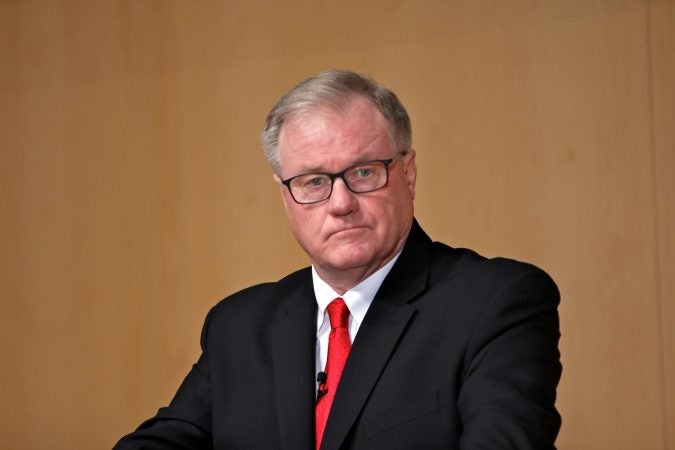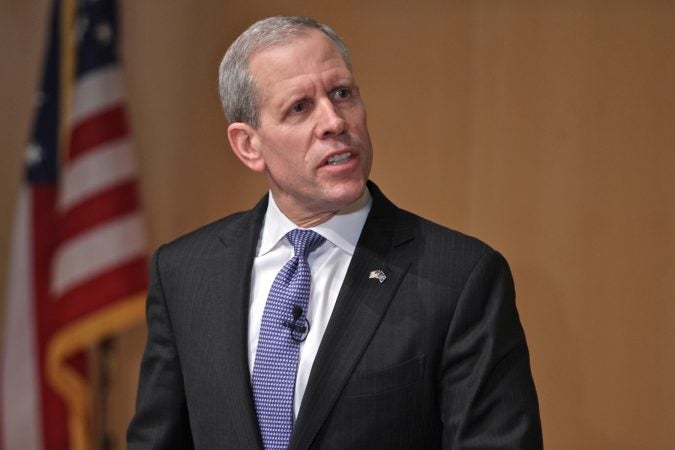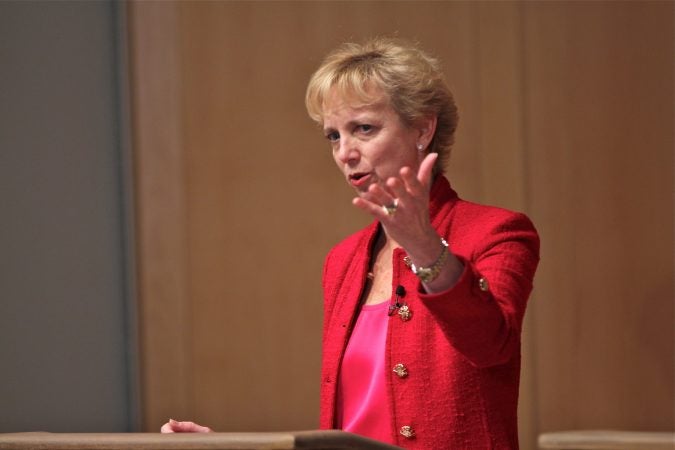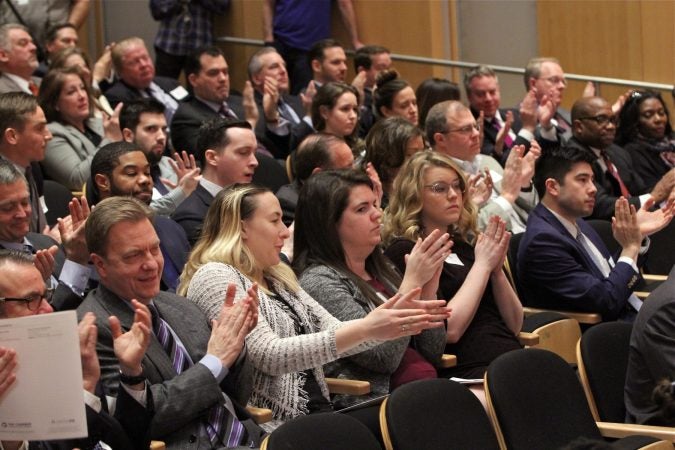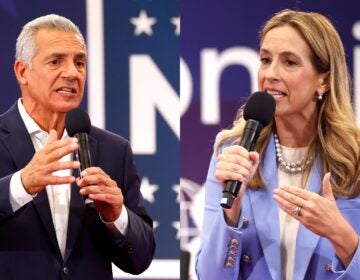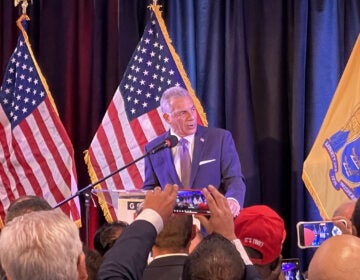Pa. gubernatorial hopefuls Mango, Wagner gently mix it up; Ellsworth avoids mild fray
Three Republicans vie for the opportunity to challenge Pennsylvania Gov. Tom Wolf in November.
Listen 1:41The three candidates vying for the Republican nomination to run against sitting Pennsylvania Gov. Tom Wolf, a Democrat, engaged in a largely substantive, respectful debate at the National Constitution Center in Philadelphia Tuesday morning.
The candidates largely agreed that the next governor would do more with less. Lowering taxes, cutting spending, and reducing regulations, they said, would unlock Pennsylvania’s private sector from the shackles constraining growth.
But the candidates disagreed enough over the course of the hourlong debate that a few small ideological differences among the three conservatives emerged.
State Sen. Scott Wagner, the one-time Tea Party upstart who’s emerged as the race’s early front-runner with the endorsement of the state GOP, was attacked by opponent Paul Mango, a recently-retired director at consulting mega-firm McKinsey & Company, for co-sponsoring an LGBTQ anti-discrimination bill. “One thing I will not do is let people by gender identity come into our girls’ locker rooms in schools in the name of generating business in Pennsylvania,” said Mango, in response to a question about attracting businesses to the state. “I’m not going to advance that bill, his bathroom bill, at all.”
Wagner countered that the bill in question, which would expand the Pennsylvania Human Relations Act to prohibit discrimination on the basis of sexual orientation and gender identity in housing, employment, and public accommodation, has nothing to do with bathrooms. “I am not supportive of girls and boys sharing bathrooms, and [Mango] knows that.”
“This is where Mr. Mango wants to take shots,” Wagner said after the debate. “Listen, I’ve labeled him, he’s ‘Lyin’ Paul.’ ” Wagner accused Mango of trying to use the issue as a wedge in an attempt to establish himself as the staunchest conservative in the race.
Lawyer Laura Ellsworth, who managed the Pittsburgh office of the big law firm Jones Day, asked debate moderator, WHYY’s Dave Davies, for a chance to respond to the issue. But, once granted, she avoided the fray between Mango and Wagner and expressed her support for the bill: “It is time that we do that, there will be no run on the bathrooms, and as someone who cares about workforce and economic development, bringing the LGBT community into the anti-discrimination law is the right thing to do.”
All three candidates touted their business chops, arguing for reduced red tape throughout the economic-focused debate which, besides the LGBTQ discrimination bill, largely avoided social issues.
Ellsworth, who is running as a pragmatic conservative, tacked ever so slightly to the left of her opponents in front of the Philadelphia Chamber of Commerce-host crowd on issues of school funding and Keystone Opportunity Zones, which provide temporary tax breaks to businesses that move to designated areas.
On education funding, all opposed increasing state support for public schools. Mango said he would refuse to “throw any good money after bad money,” arguing that there was no correlation between education costs and test scores. Wagner also said Pennsylvania spends “enough money in the schools per student,” noting that spending per pupil across the state is about $3,000 above the national average, a statistic that critics argue masks large funding differences between poor and wealthy school districts, as well as the nuances of the regional economy. Ellsworth said she also opposed funding increases, but prefaced her remarks by saying, “I don’t believe we have a fair and equitable system for funding our schools.”
Ellsworth, who like her opponents supports expanding charter schools, then suggested a need to reform how those schools are funded — currently, funds for charter schools pass through district budgets after the traditional system deducts certain fixed expenses. “Right now, we have a system where we are asking school districts to slit their wrists and bleed themselves for other children, that makes no sense,” said Ellsworth. “We need to fund alternative education in a more fair and rational way.”
Wagner and Mango both said they support eliminating property taxes, which fund local government and schools, but Wagner accused Mango of a “complete flip-flop” on supporting a bill to replace property taxes with increases in state income and sales taxes. Mango denied it, saying he simply held off backing the bill until he learned more about it. Ellsworth blamed rising school pension costs for “the property tax problem,” but didn’t say whether she supported cutting them.
All three called for cutting the size of Pennsylvania’s General Assembly, the most expensive legislature in the nation. Mango used the issue to bash Wagner, a state senator who says he’ll use zero-based budgeting to find cost savings as governor. “The [state] Senate has increased its cost by 60 percent in the last three years, so I have the suggestion that might be a good place to start with the zero-based budgeting,” said Mango.
On Keystone Opportunity Zones, Ellsworth said she supports the program, but wants tweaks. “I think it constitutes an investment that is attractive and brings business — we’ve seen that happen again and again,” she said. “What I do not believe they should be, is perpetual corporate welfare.”
Ellsworth argued for making the zones offer tax breaks “on the back end, on a payroll tax,” to ensure that companies receiving them actually hire more workers.
“A Keystone Opportunity Zone is an admission that we have a fundamentally unattractive business environment,” responded Mango, arguing that the zones have been largely ineffective in spurring job growth.
“I want to make the entire commonwealth of Pennsylvania a Keystone Opportunity Zone,” added Mango, touting a proposal to cut the state corporate tax rate from 9.99 percent to 3.07 percent. “Why favor one geography over another? It doesn’t make any sense to me.”
Wagner sidestepped the question, saying workforce development was more important than business attraction. “We have a bigger problem: We have 200,000 skilled labor positions that are open in Pennsylvania,” he said. “We keep talking about bringing more businesses into Pennsylvania, creating more jobs. We have to solve the problem we have now.”
WHYY is your source for fact-based, in-depth journalism and information. As a nonprofit organization, we rely on financial support from readers like you. Please give today.



